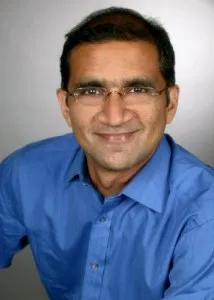Sanjay Parthasarathy’s Mantra for Product Entrepreneurs: “If You Can’t Think Big, You Can’t Really Scale”
Even top-notch corporate executives get bored with their work and that’s what happened to Sanjay Parthasarathy. Maybe in such cases the corporation is no longer seductive enough to feed the creativity or a stray thought emerges to create something on one’s own instead of creating newbies at corporations. Sanjay spent a little more than two decades at Microsoft, at the forefront of many

new initiatives including the Startup Accelerator Program, which he headed, before he exited to become a startup entrepreneur and investor. The geeky executive headed home after a long stint in the US, to Chennai and started Indix, which is into data analytics and products that impact people’s lives. It would be of relevance to indicate that Sanjay directed Bill Gates’s first visit to India in 1997 and that led to a spurt in Microsoft’s India activities and also had high and positive impact on the software industry in India. Besides being an entrepreneur at Indix, he also plays angel investor and mentors startups in the US and in India. In conversation with YourStory, Sanjay spelt out his philosophy and his point of view.You were in the US for 23 years; you graduated from MIT, worked at Microsoft for 19 years, what triggered you to come back to India?
I think I was a little bored, and the opportunity here was quite ripe, so it is really a combination of these two things.
If you have to look back at your corporate journey heading various divisions at Microsoft, what were some of your biggest take-aways?
Probably, creating things from scratch. I was with the Internet Explorer, then with .Net, and I helped set up the startup business accelerator. So, I always started things from scratch at Microsoft, so that was the biggest learning to do the startup kind of thing.
Starting stuff in bigger organizations vs. starting up as nobody, what are the differences?
Philosophically, they are the same things. You still have to argue for money, though the funding comes from the company in one case, you still have to put your idea out in the market, you still have to recruit a team, as they don’t give all of that to you, you have to take it. In a way, you have to do the same things.
When you came back to India, did you come back with the idea of Indix? Tell us a bit about that.
The idea of Indix came up a year after I came back to India. Probably I started working on it in 2010. I started thinking about my personal experiences in 23 years in the US, and the idea evolved during that thought process.
You have been angel investing since the time you have come back, how have you seen the startup ecosystem evolve from 2009?
Definitely, more product companies, more Cloud companies, and definitely more youngsters getting involved. I think the role models of MakeMyTrip, Snapdeal and redBus created a group of folks that think to be more of classic entrepreneurs, younger and willing to take more risk, A lot of them don’t have that evolved idea, a lot of them are learning on the job, so that way we see lots of entrepreneurs with not much experience, but you have to start somewhere.
You have made some investments, what are the key things that you look at while investing in companies?
I have not made many investments, I have made two or three, and the reason is, that is the way I like it, and I like to work closely with the teams. My goal is not diversification, spray and pray. I am not a short- term investor, so in a way it is very much focused on the people. Vishal Gondal and I do this together most of the time, and we take our time, we make sure we spend our time with the team, and only then we get involved.
What are some of the big opportunity areas for Indian entrepreneurs in your view?
Well, almost every area has an opportunity. And, scale probably is the only advantage in this market, it
is not necessarily about IP, or not necessarily about operations, it is all about scale, in almost every area, whether it is hospitals, e-commerce, education or any specific area, if you get to scale that is the biggest opportunity area. And, almost every area is open.
What are the biggest challenges for product tech entrepreneurs in India today?
I don’t see enough people thinking about how to scale, not many people think about how to structure or architect the business so that you can go from one state to another, or you go from one segment to another, from a million to 10 million. It almost feels like people care more about getting to the year end as opposed to building a very large company, and in a country where the single biggest opportunity is scale, that is probably the wrong way to think about it. The second biggest problem is that exits are way too hard, and that is why I encourage a lot of people to incorporate and iterate in the US, where it is a lot easier to get funding, a lot easier to exit. The whole finance thing, funding, exits are just too hard here in India.
So when you were setting up the team for Indix here in India, how challenging was it for you?
As a CEO, the three things I do, is ensuring funding, recruiting and ensuring that the vision is being executed. Recruiting is hard. I interviewed close to 100 people before I hired the first person. It took 9 months to find the first person, and some people are lucky to start with friends or colleagues from their previous company, but I had to go out and find my co-founders, because all the people that I went to school with or worked with are in the US. So, it is hard, but you know what, that is how it should be.
What are some of the tips for younger entrepreneurs looking to set up teams?
Keep at it, you can’t compromise, it is okay to take 9 months, your idea will probably evolve by then, so I incorporated the company in 2010, and I got the team together in January 2012. That is how it is to recruit the first few members.
What are the key takeaways from the Valley for Indian entrepreneurs?
People don’t think big enough here. There are really few folks that really think big. People were surprised when Snapdeal moved into products, and that is because Kunal has it in him to think big. Again I go back to saying scale is the biggest advantage of being in India. If you can’t think big, you can’t really scale, and you are wasting the only advantage of this market, and too many people have too many small ideas. So, think big, and think scale.
What advice would you give to younger entrepreneurs?
I would say get a mentor. I mean somebody like Vishal is a wonderful mentor. He has enough ideas, experience, and can relate to youngsters. They are hard to come by. Probably finding a mentor is the best way to learning from other people.
We thank Sanjay for sharing his time and insights with us. We wish Sanjay luck with Indix, and soon plan to bring you a detailed story on Indix as well, so keep reading!







